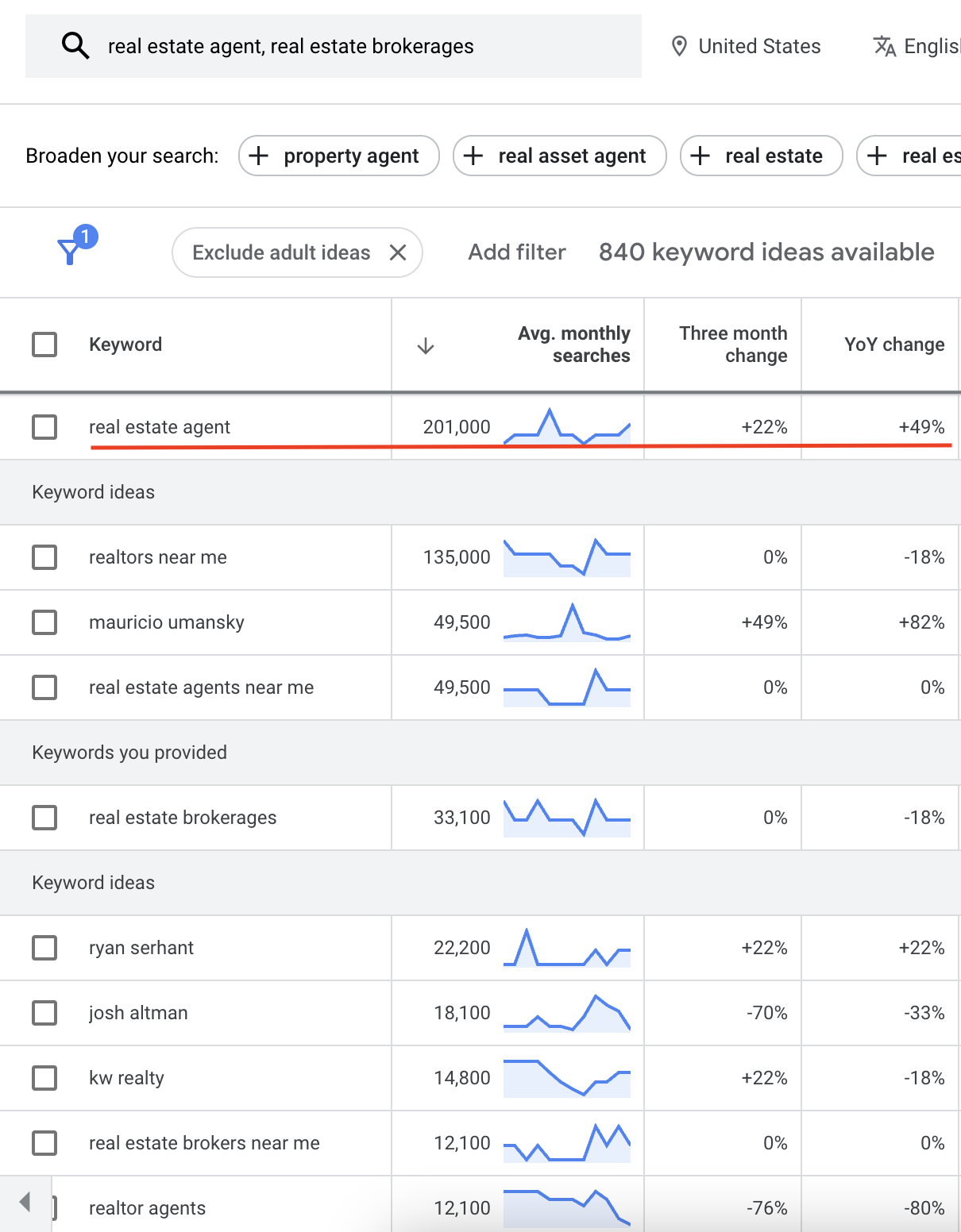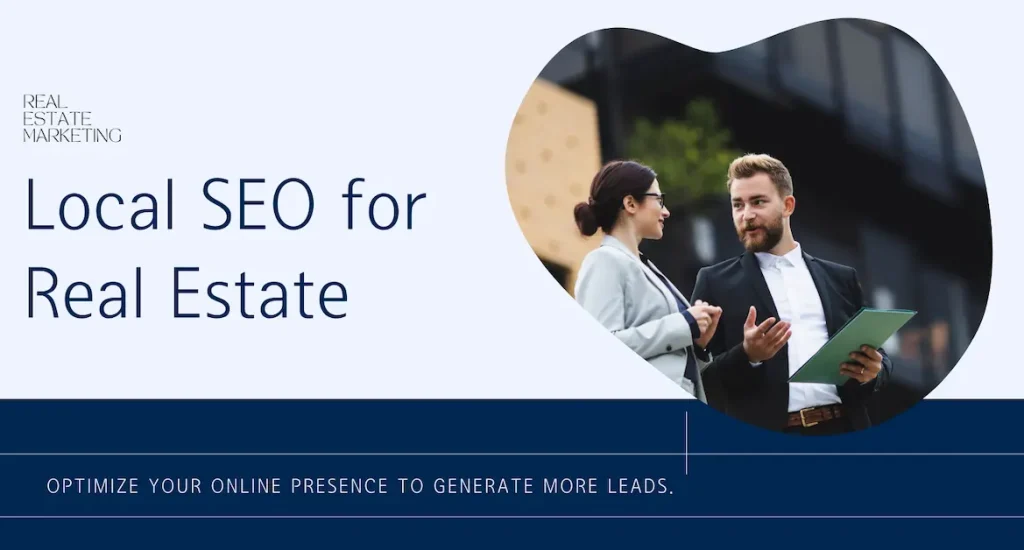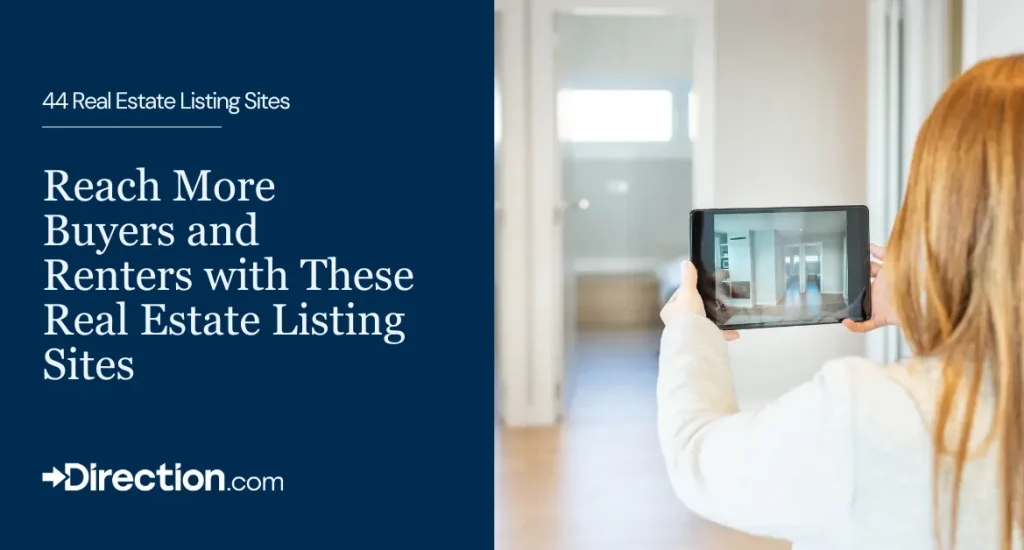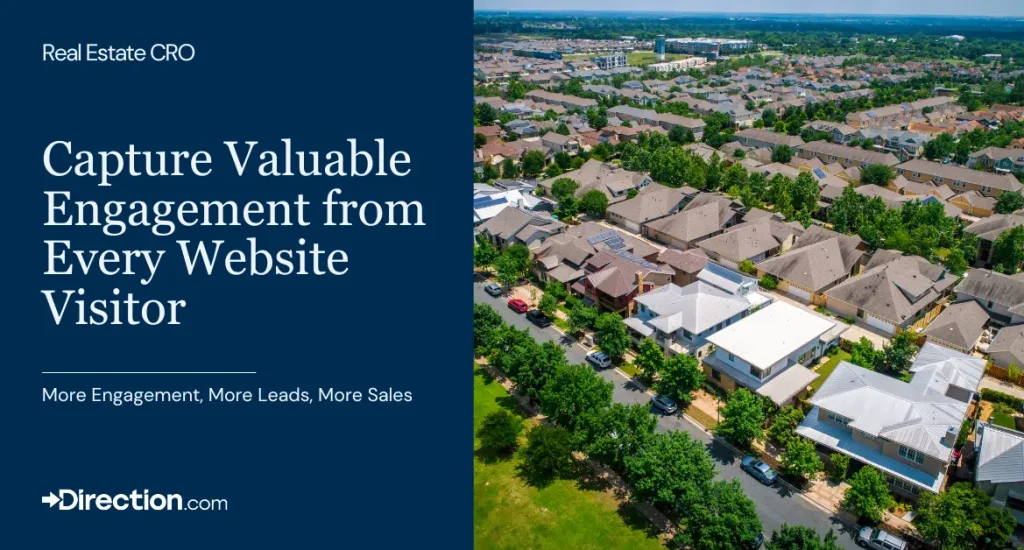At its core, real estate is a local business. No matter how wide your region extends, home buyers are focused on their specific city, neighborhood, or ZIP code during their search. That’s why local SEO for real estate is not optional – it’s essential for brokers and agents looking to connect with motivated sellers and buyers right in their backyard.
Optimizing your website for local SEO is critical for connecting with motivated sellers in your city and specific neighborhoods. With over 80% of home searches starting on Google, ranking highly for localized keywords can help drive qualified traffic that converts into promising seller leads.
Let’s explore key optimization strategies real estate brokers should prioritize to improve visibility and leads on a hyperlocal level. We’ll cover important topics like:
- Optimizing website pages for individual cities, neighborhoods and ZIP codes with geo-targeted content
- Structuring URLs and on-page elements for locality
- Using business name, address and phone number (NAP) citations to strengthen local signals
- Implementing service area pages to improve rankings for the regions you serve
- Leveraging structured data markup to provide Google supplemental info like your address
Gaining more exposure in Google’s critical 3-pack map listings and ranking well for searches containing neighborhood names or “real estate agent near me” requires an understanding of local SEO best practices. By implementing these location-based optimizations, brokerages can attract many more potential sellers researching agents active in their precise area.
Let’s dive into the specifics of real estate website localization to make sure your firm doesn’t miss out on connecting with promising new leads right in your backyard.
What is Local SEO for Real Estate?
Local SEO for real estate refers to optimizing a real estate website or agent’s online presence to rank higher and be easily found by potential home buyers searching for properties and agents in specific cities, neighborhoods, zip codes, etc.
The main goals of local SEO for real estate agents are:
- Help real estate agent websites rank higher in local search engine results on Google, Bing and other search engines when someone searches for terms like “real estate agent in [city]” or “[neighborhood] homes for sale”.
- Make it easy for nearby home buyers to find and connect with a real estate agent when searching online for homes for sale in specific geographic areas.
- Build an agent’s local authority and dominance for geographic keywords and locations they want to target.
- Generate more leads and inquiries for real estate agents from local home buyers who are actively searching and ready to buy.
- Reinforce a real estate agent’s or brokerage’s location-based brand awareness and visibility online.
Key local SEO tactics used in real estate include optimizing Google My Business listings, creating location-optimized content and pages, earning local links and citations, and optimizing for local pack rankings. The ultimate goal is driving more quality leads from local searchers.
Key Benefits of Local SEO for Real Estate
Local SEO can help real estate brokerages capture more attention and business in several key ways:
For Buyers:
- By ranking higher in local search results, the brokerage’s website and listings gain more visibility when buyers search for homes for sale in specific areas.
- Optimized local business listings and profile information builds trust and makes it easy for buyers to find and contact agents at that brokerage.
- Location-based content and outreach earns brokerage links/mentions on other locally influential sites. This helps attract nearby home buyers.
For Sellers:
- Improved local rankings and visibility helps capture more seller leads who are ready to list their homes.
- SEO establishes the brokerage as an expert on the local market, enticing more listings.
For Recruiting Agents:
- Good local rankings and lead gen establishes the brokerage as an attractive place for agents to work and build their business.
- Location authority aids recruiting by showing agents the brokerage dominates activity in key areas.
- SEO-generated leads provide new agent recruits with quality prospects immediately upon joining.
In general, strong local SEO allows a brokerage to visibly dominate local real estate markets, gain authority, and generate more leads – major attractions for buyers, sellers and agent recruits.
People Are Turning to Google’s Local Search When Looking For a Real Estate Agent
Believe it or not, this is data directly from Google, reflecting that year over year there is an almost 50% growth in people searching for “real estate agent”, and almost 50,000 people in the US every single month search for “real estate agents near me”. Don’t ignore the hard evidence, start prioritizing your local search presence ASAP and drive more organic traffic or let your competitors leave you in the dust.

Checklist: 10 Steps to Improve Local SEO for Real Estate
Here is a ranking of the most important local SEO best practices for real estate agents and brokers.
We created this checklist to provide actionable steps that you can take today to start gaining more local traction and, ultimately, earn your top spot in the Google Local Pack.
Yes, it’s a lot of work. But if you follow this checklist, I guarantee you will earn more high-value keyword rankings, better website traffic, and more leads from local sources.
1. Optimize Google My Business Listings
- Create a separate GMB listing for each agent if they serve different geographic areas. Make sure their business name, address and categories reflect their service location(s).
- Fully complete each profile – website, hours, detailed description of services, area served, property types, languages spoken etc. Accurate info helps Google understand the business.
- Upload a profile and cover photo for each agent, as well as photos of their listings. Photos make the listing more visible and trustworthy.
- Include keywords like the neighborhood(s) served, “real estate agent”, city name, and property types in the business description. This helps surface the listing for relevant searches.
- Set a specific service area for reach listing to indicate the geographic area you serve. Service areas can be complex polygons covering specific neighborhoods.
- Request reviews from past clients, especially those located in key cities/neighborhoods you are targeting. Reviews build local trust signals.
- Ensure NAP consistency across GMB, website, and citations like Yelp. Matching name, address and phone reinforces your local authority.
- Respond to reviews and use GMB posts to highlight community involvement and local market expertise. Be helpful and engaging.
2. Get Local Backlinks
- Identify the top local directories relevant to real estate like Yelp, Zillow, Realtor.com, etc and claim and optimize listings on each. Consistent NAP helps citations.
- Look for niche real estate sites like blogs, associations, magazines that cover topics or areas related to your market. Reach out to contribute expert content and get links.
- Search for influential neighborhood blogs, sites or publications that local residents read. Pitch locally-relevant guest posts to get links from these hyperlocal sites.
- Sponsor or get mentioned on sites like Best of the City that review and recommend top local real estate agents. The awareness boosts credibility.
- Seek opportunities to speak at local real estate events, conferences, or seminars. Having a presence on authoritative domains helps SEO.
- Conduct outreach to local reporters who cover real estate topics. Become a trusted source for relevant data and insights. Media mentions add credibility.
- Where possible, obtain memberships in recognized local real estate organizations and get listed on their sites.
- Avoid low-quality advertising directories and focus on getting citations on reputable domains with high trust and authority scores. Quality over quantity.
3. Create Geographic Landing Pages
- Create pages that target individual cities, neighborhoods, or zip codes. For example “Real Estate in Beverly Hills” or “Homes for Sale in 60201”.
- Include the target location name prominently in the page’s title tag and H1. Eg “Beverly Hills Real Estate – Top Agents”.
- If possible, incorporate location names into the page URL structure. This helps search engines understand the page relevance.
- Write long-form, unique content for each page focused on the target location. Embed references to the city/neighborhood throughout the copy.
- Optimize content for keywords like “Beverly Hills real estate agents” or “60201 homes for sale”. Include common buyer questions.
- Add schema markup to clearly identify the page geography. This helps search engines understand location relevance.
- Include a list of available home listings in the target location, with photos, details and calls-to-action.
- Place internal site links pointing back to key location pages to pass link equity and relevance signals.
- Set up conversion tracking to see which geo-targeted pages generate the most traffic and leads.
4. Publish Local Guides on Your Blog
- Create posts that focus on specific cities, neighborhoods, or zip codes your business serves. For example “The 2022 Crenshaw Real Estate Market Forecast”.
- Prominently mention the location name in the blog title, meta description, URL, H1 tag, and content headers.
- Include the target keyword phrases in the copy – such as “Crenshaw real estate trends” or “Homes for sale in Crenshaw”.
- Embed references to the neighborhood throughout the post content. Quote local agents and link to resources about the area.
- Add images of the location, maps, or properties in the area to visually reinforce the local relevance.
- Interview top agents who specialize in the neighborhood and quote their local expertise in the blog post.
- Share unique data and stats about real estate sales, trends, development projects etc. specific to that neighborhood or zip code.
- List current property listings in the area and link to their full details to provide value to readers.
- Syndicate and promote the locally-focused posts through localized social media channels, neighborhood groups, etc.
5. Get Reviews from Locals
- Look up past clients in your CRM system that are located in your priority zip codes and neighborhoods.
- Send emails or mailings to those clients requesting reviews and emphasize you are building your presence in their local area.
- Provide easy review links directly in your outreach. For Google, include the auto-generated review link in the email.
- Offer incentives for leaving detailed reviews based on their experience working with you in their neighborhood.
- When the client was satisfied, politely follow up if you don’t see a new review appear within 2 weeks. Remind them of the value.
- Respond promptly to any reviews left by local clients thanking them for the feedback and detailing how you serve that area.
- In calls/emails with current clients, ask if they know any neighbors, friends, or contacts in the area that may also provide reviews.
- When featuring testimonials on your site, try to include some from past clients located in the target neighborhoods.
6. Update Your Site Architecture
- Audit your site’s navigation menus and footer links. Look for opportunities to add links to important location pages.
- If serving multiple metro areas, consider adding a “Locations” or “Cities We Serve” menu with links directly to each key location page.
- For large metro areas, you can drill down further by having submenus for neighborhoods or zip codes under each metro link.
- Keep access to location pages simple with no more than one intermediate click from main navigation links. Don’t bury these pages.
- Ensure XML site maps include all optimized location pages and submit them to search engines. This aids crawling.
- Add schema markup to the footer and contact page to identify regions, metro areas, zip codes, etc you serve.
- If using on-site search, expand it to include geographic keywords and return relevant location pages in results.
- Make sure internal site search returns metro, neighborhood and zip code pages for related keyword queries.
- Set up tracking parameters for site architecture links to see which location access points perform best for clicks and conversions.
7. Inter-link Relevant Content
- Identify your most important location-based landing pages that you want to rank well – such as key cities, neighborhoods, zip codes.
- On each page, link relevant keywords and phrases to your other key location pages where appropriate in the content.
- For example on your “Soho Realtors” page, link phrases like “Greenwich Village condos” and “Tribeca lofts” to those neighborhood pages.
- Place links in headers, body text, photo captions, and other elements – don’t just confine to one area.
- When linking, use anchor text that includes the target location name for optimal SEO value.
- Create location-focused silos linking groups of related geo-pages like neighborhoods in a metro. This strengthens the interconnections.
- Pay attention to linking from deeper pages up to your location homepages as well. Mix up internal link flow directions.
- As you add new location-based content, keep building links from that page into older related geo-content.
8. Optimize Title Tags and Meta Descriptions
- For each location page, include the target city/neighborhood name prominently near the start of the title tag.
- Also work in relevant keywords like “real estate agents”, “homes for sale”, or “apartments”.
- Keep titles under 60 characters, concisely summarizing what the page offers for that location.
- In the meta description, use a compelling value proposition for why local buyers/sellers should contact your agents in that area.
- Include the target city/neighborhood name and keywords naturally in the meta description.
- Craft the meta description to strongly match the searcher intent for geo-targeted queries.
- Brainstorm a list of potential searches a user might do to find an agent for that location. Align with those.
- Use unique, compelling descriptions for each page rather than duplicating the same generic description.
- Check that titles and descriptions are consistent wherever that page appears – like in search results.
- Periodically revisit optimizing page titles and descriptions as new location-based content gets added to the site.
9. Build More Local Citations
- Research which niche real estate sites, associations, publications etc are most relevant and popular in your metro area and surrounding region.
- For agents, submit your full profiles to residential directories like Realtor.com and Trulia to get added to their local database.
- For commercial brokers, get listed on popular commercial real estate directories like CityFeet, Showcase, and Loopnet.
- Look for opportunities to be included in invite-only curated agent lists like top local real estate agents on Zillow or niche sites.
- Ensure all directory profiles use consistent NAP information that matches your other citations and website. This establishes authority.
- Check if the directory lets you specify geographic service areas or link to your location-specific profile pages.
- Join relevant regional/local real estate associations both for citation benefits and networking/marketing opportunities.
- Claim and optimize brokerage profiles on any aggregator sites that pull listings from MLSs.
- Where allowed, upload high-quality photos and detailed agent/brokerage bios to stand out.
10. Add Local Business Schema
- Use schema.org’s LocalBusiness markup and identify the geographic scope your business serves.
- For the address field, specify the full street address of your main office location.
- Populate the ‘geo’ field with your latitude and longitude coordinates. There are sites that provide this data easily.
- Specify the regions, neighborhoods, metro areas, zip codes, etc. that you serve in the ‘serviceArea’ field.
- For businesses with multiple locations, create a LocalBusiness markup for each office address.
- Use the ‘areaServed’ field to indicate the distance you will serve around a given location. For example “Within 20 miles of downtown Dallas”.
- Add opening hours, contact info, payment accepted, and other details relevant to home buyers.
- Where possible, identify key personnel with schema.org’s RealEstateAgent markup on your team page.
- Supplement with other applicable markup like Website, ImageObject, etc. Follow schema.org standards.
- Use Google’s Structured Data Testing Tool to validate your implementation and check for errors.
- Add markup to key location pages in code and insert via Google Tag Manager for wider implementation.
Conclusion
Local SEO is clearly essential for real estate agents and brokerages looking to expand their online visibility and capture more business in specific geographic areas. By focusing on key elements like optimizing GMB listings, building locally-relevant links and citations, creating location-based content, and strengthening on-page optimization for geo-targets, you can build authority in the regions you serve.
The payoff is huge – our clients consistently find local SEO generates 2-3X more leads from high-intent searches like “real estate agent in Austin Texas.”
Rankings like that are what makes an impact on your bottom line.
If you’re ready to execute a comprehensive local SEO strategy tailored for your metro markets and neighborhoods, our team of experts is here to help. We specialize in real estate local SEO and have proven systems to help you dominate the rankings in your geographic focus areas.
Contact us today for a free Local SEO consultation so we can outline your path to becoming the #1 local real estate resource in your region.











